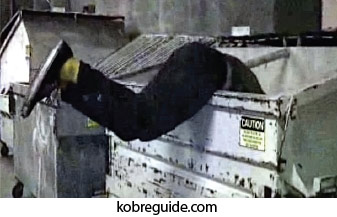The value in dumpster diving

One person's trash is another person's treasure.
This idiom is proving its value with the cult of dumpster diving: a free, do-it-yourself method of collecting food from the dumpsters of restaurants, supermarkets or one's neighbourhood trash bins.
Sound gross? Maybe. But it is also environmentally friendly and avoids those grocery bills that loom over students' heads every month or so.
Maggie F. (last name withheld to protect privacy) is a former Fanshawe student who took to dumpster diving with a vengeance. Not one to be afraid of nosy onlookers, Maggie has been active in dumpster diving since she first lived in London in 2009. She now lives in Oakville.
"I'm not one to actually 'dive' into the dumpsters," she explained. "(That) can be dangerous. There could be a lot of things in there that could potentially cause bodily harm: glass, needles, anything broken. So if I'm 'diving' at a large dumpster, like outside major grocery stores or apartments or student housing, I try to just pull garbage bags out or up high enough so that I can untie the bag and see what's inside."
Maggie explained the ritual of a diver: never dump the bags out! Part of being a dumpster diver is being respectful and not leaving a mess.
Maggie is a vegan and follows a holistic way of life. While living in Toronto, she found that there was an abundance of organic markets that tossed away good quality organic food. Most of these markets would mark their bins with "organic waste only," so it was simple to spot and scavenge.
"These places throw away food that they can't sell because it's not beautiful. Most people who shop at organic places are fairly affluent; they will pay for the best. So if it doesn't look perfect it gets thrown out— even though I've paid for stuff in worse condition!"
Part of the culture of dumpster diving, is the term freeganism. According to freegan.ca, "Freeganism is a way of life based on the belief that almost all work and monetary exchanges within a capitalist economy contribute to myriad forms of exploitation such as worker abuse, animal exploitation, hunger, ecological destruction, mass incarceration, war, inequitable distribution of resources, commodification of women and almost all issues addressed by social, ecological and animal rights advocacy groups. It is a combination of 'free' and 'vegan' and espouses a philosophy of living an ideal life."
Part of the fear of dumpster diving is the dirty image it conjures. Why would you eat garbage when you can get food from the store?
Maggie laughed when asked this question. "Why would you pay money for something that's perfectly good and safe to eat when you could get it for free?"
Point taken.
"Dumpster diving is fun, interesting and necessary," she exclaimed. "I think in our modern world, where you can walk into a store and find almost anything you want at any time of the year, we've really become desensitized. We don't ever have to wait for anything, for example fruits and vegetables coming into season. We don't have to hunt or gather like our ancestors, like some cultures still do."
"I think there's an innate survival instinct in us that's engaged by dumpster diving: there's something in us that drives us to search for food and the way our culture is now, we're missing that. I also love the adventure of looking for good food; you never know what you're going to find, so that's exciting too. Some days I'll find enough food to last me all week, other times maybe just a day or two."
Maggie admitted to falling on some hard times, which is why she began in the first place. But now, she said she believes she'll always do it. "Based simply on principle, there's no reason for all this food to go to waste."
"It makes sense to keep up this as a lifestyle choice. Not only is it a good financial decision for me, it's an ethical choice too. To choose to use what has been thrown away rather than continuing to feed into the wasteful system of overproduction and underconsumption makes sense. Like I said before: why keep buying and wasting when you can use up what already exists? In June I spent a total of $27 on food. According to Stats Canada, the average person spends $244 per month. A little bike riding, a little hunting and the unpredictability of what I'm going to get ... totally worthwhile. I'm eating beautiful, healthy, organic food for free."
For those who may want to learn more about the culture of dumpster diving, Maggie recommended books like American Wasteland by Johnathan Bloom and The Scavengers' Manifesto by Anneli Rufus and Kristan Lawson.
For more information on freeganism, visit freegan.ca or wastedfood.com. Also, foodnotbombs.net is a website that promotes free vegan and vegetarian meals to those in need.













